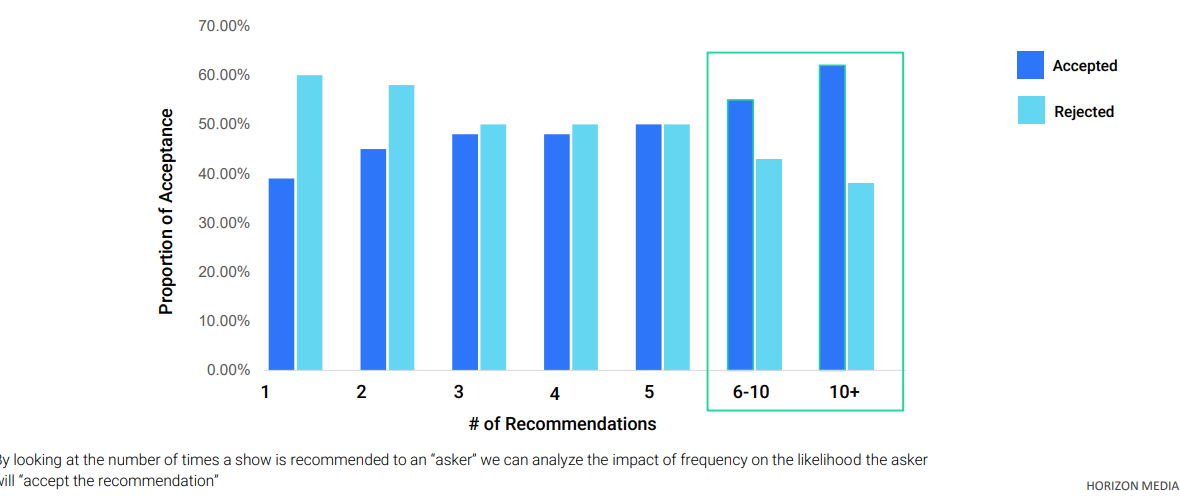
Deciding what to watch is harder than ever. Convincing viewers to watch a particular show is getting even more complex.
Horizon Media turned to artificial intelligence to find patterns in social media that would help it find what influences viewers. One thing it found was that what it called “everyday influencers” play a bigger role in program selection than people with huge social media following.

Traditionally, the best way to get people to watch a show on TV has been to promote it on TV. But with a huge share of people watching TV with a smartphone in their hand, social media is becoming an important way people sift through viewing options.
Horizon points to one study that shows that 33% of viewers use word of mouth via social to reduce the massive menu of options available to them.
After on-air promos, the second most important influencer of viewer behavior is recommendations from friends and family, Kirk Olson, senior VP, entertainment Insights & Consulting at Horizon Media, told Broadcasting+Cable.
“Recently we’re seeing those recommendations from family and friend moving into online, digital and social conversations,” Olson said. “People are using social media recommendations as a way to make the final decision about what they want to watch and what they don’t.”
Artificial intelligence provided Horizon with a tool to figure out the way people were connected via social media.
“There was no way we could do it without AI,” said Sheri Roder, executive VP and chief of WHY, the agency's intelligence center of excellence. “The AI allows us to do this kind of work and really get in there and understand what was going on and see patterns that I don’t know that would would have seen otherwise.”
Once properly trained (by a human), “the AI does a much better job than any of those previous tools in understanding that data in a much more human way,” Olson added.

Horizon looks at social-media posts that simply asked, “What should I watch next?” Not surprisingly, the more times a particular show was recommended to the ask, the more likely it was that the recommendation would be accepted.
If a show was recommended once, the chance that the show would be watched was only 40%. The odds were 50-50 when a show was recommended five times. When a program got more than 10 recommendations, the recommendation was accepted 60% of the time.
Some recommenders had more influence than others -- and surprisingly it wasn’t celebrities with tons of followers that people online seemed to listen to.
Most powerful were recommenders with just 100 followers. Their recommendations were accepted more often that those from people with thousands of followers, Horizon found.
“Your mom could be an everyday influencer, because it not about follower count,” Roder said. “When it comes to shows, the important thing is that they’ll follow recommendations from someone who shares their interests.”
In its research, Horizon studies the bios of the recommender and the person seeking a recommendation. When there was a higher level of commonality in the bios, the recommendation was twice as likely to be followed.
Looking at the bios of people who were identified as “everyday influencers,” Horizon found they were fans of either sports or culture; they tended to lean left in politics and they were often part of the “culture class” and described themselves as authors and writer.
Horizon also found that every title had its own community of influencers. A person can be an influencer within that micro-community, whether or not they’re an influencer in the broader social media realm, Roder said.

And each show’s micro-community is different. For Netflix’s Bridgerton, for example, 26.1% were pronoun announcers, 7.6% were authors or writers and 4.8% were animal lovers.
For Ozark, another Netflix show, 11.9% were pronoun announcers, 9.9% were sports fans and 7.8% were proud parents, with 6.4% calling themselves animal lovers, culture enthusiasts or film lovers.
Using AI, Horizon also looked at what people said about a show when recommending it. For example, with Apple TV Plus’s Ted Lasso, key themes were that it was a feel-good show, the titular character’s positive attitude and kindness and that the show was funny and good natured.
With the granular data AI generated, Horizon was able to figure out what would resonate with individual shows' communities and come up with potential ways to promote the show to influencers.
With Ozark, influencers tended to be millennial men who were party goers, outdoorsy and loved sports. They liked sports in general, golf and SEC college sports; music; outdoor oriented brands like REI and GoPro and liquor brands Dos Equis and Jack Daniels.
To activate those influencers, a sponsorship of parties celebrating highlights show on MLB Network could be effective. So would micing up a player (reminding viewers of the wiretapping that’s part of the Ozark storyline). Partnerships could be struck with liquor brands to create tailgate parties during SEC games, with clips of the show playing during commercial breaks. Brands also could partner with GoPro to create on outdoor team challenge course and livestream the first-person footage.
Other ideas included sending Ozark star Jason Bateman to SEC conference games or teaming up with local breweries to how viewing night or trivia night with questions based on the show.
Horizon is taking its findings to media clients and planning to build programs to take advantage of its research.
“With the granularity of the information we are getting, we can cut that up and then help clients to focus their efforts in these very specific areas,” Roder said.







